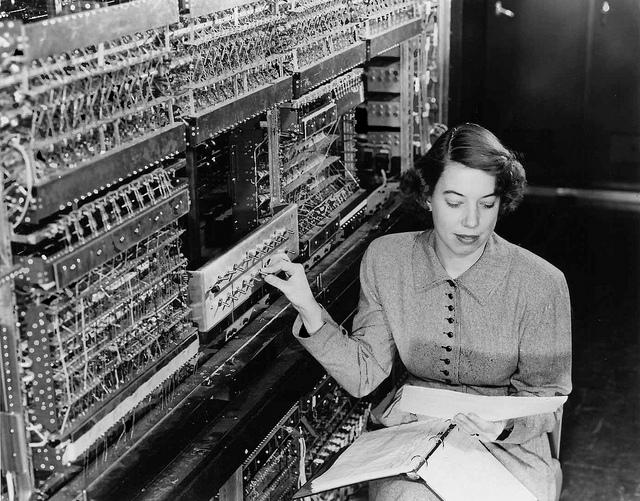Is your grandmother a particle physicist? Did she help the Navy build submarines or make concoctions of chlorine gas on the family’s front porch? Or is she a mathematician, inventor, or engineer? If so, then baby, your grandma’s got STEM.
Grandma Got STEM is a celebration of women working in and contributing to the fields of science, technology, engineering, and mathematics. It is also designed to combat the doting, fumbling, pie-making stereotype of grandmatrons.
That’s why Rachel Levy, an associate professor of mathematics at Harvey Mudd College, is collecting the stories of grandmas across the various fields of STEM. She first got the idea after hearing someone utter the phrase, “Just explain it like you would to your grandma.”
At first blush, such a thing seems harmless. But think about what it means—basically, all older women are stupid.
“For two or three years I thought about how I could address this issue without just making people angry and more inclined to use the phrase,” Levy told me. “If I could come up with a million examples of grandmothers who were tech-savvy, people wouldn’t say it anymore because it wouldn’t be apt.”
While attending the conference ScienceOnline this year, Levy realized she could harness the power of the Internet to collect stories and showcase them. So far, she’s been able to upload at least one grandma a day for about a month and a half—and the stories keep pouring in. Levy’s aim so far is to be as inclusive as possible. She’s accepting any grandma currently or previously involved in STEM. They can submit themselves or you can submit for them. Heck, they don’t even have to have children with children, per se. Age’ll do just fine.
GGSTEM tells the story of Iris Critchell, a great-grandmother who flew more than 20 different types of military planes and member of the National Association of Flight Instructors Hall of Fame. There’s Susan McKinney Seward, the first black, female doctor in New York and third in the nation. And Toni Zala, the first woman in Hungary to earn a Ph.D. in biochemistry.
More to the point, some of us are guilty of shrugging grandmothers off as being hopelessly tech-illiterate, when in fact many mee-maws pioneered the newfangled electronics we hold dear. Margaret Oakley Dayhoff “applied punch card machines to calculate the resonance energies of several polycyclic organic molecules,” pioneering mass-data processing. While working on missile design and landing force support for the Center for Naval Analyses, Margaret Paul wrote computer programs with no more coding training than a few Fortran books. Dorothy Weinshank Gillett started her career by learning how to make radio waves go farther and ended it doing orbital calculations for the Mercury and Apollo projects.
The stories go on and on. Which is to say, of course they do. Of course women have contributed much to the annals of science. Of course they have overcome great odds and persevered through all manners of discrimination and sexism. Of course they had more interesting things in their lives than attending our choral concerts and soccer tournaments. Some of that might even be plain ignorance of our grandmothers’ contributions to STEM.
“Another thing that has happened with this that I really didn’t expect is people telling me, ‘I think my grandmother did something related to science or engineering but I never really talked to her about it. Let me get back to you!’ It has started these amazing conversations between people about their life experiences,” says Levy.
Given Levy’s professed strategy of inclusion, maybe we should be looking beyond all the grandmas with fancy degrees. In fact, it was uneducated, older women who contributed some of the best pattern recognition for FoldIt, the crowd-sourced company that gamifies nanobiotechnology. Those grandmas got STEM!
So I’ll ask you again: was your G-Ma a chemist, an applied mathematician, a data analyst, or an astronomer? If so, give her story to the ages over at Grandma Got STEM.
